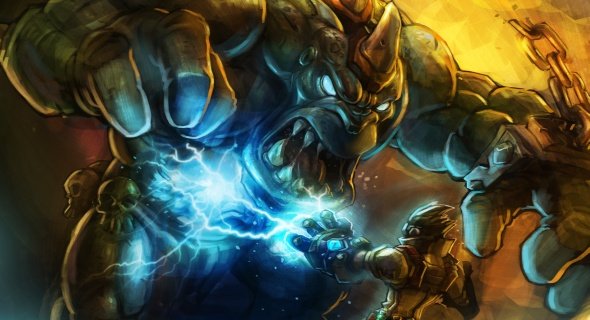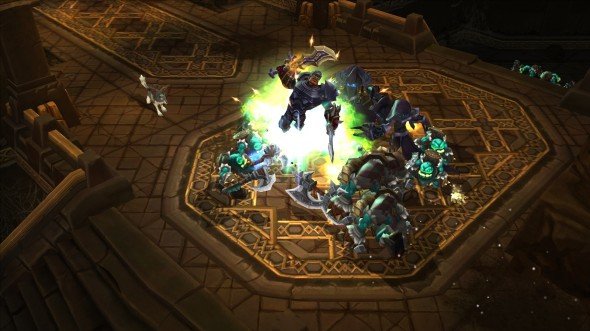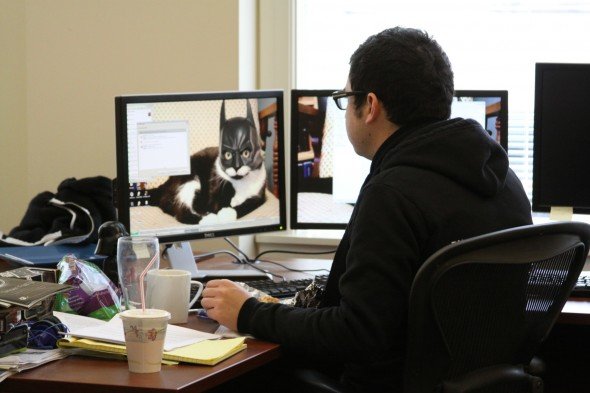
Diablo casts a long shadow over the action-RPG. Few games have been able to dispel Blizzard's gloomy dominance of the genre, though many have tried. Only Torchlight shines in the dark. A modest game in scale and price, made in a year by a small team, it is as accomplished a resurrection of the genre as anyone could want.
It's cheery and accessible too, doing as much as it can to delight the player as they mop up hordes of monsters in its colourful, randomised dungeons. Now its developers, Runic Games, plan to transform this success into a platform for an MMO based on the Torchlight world.
Despite its unassuming, accessible look, Torchlight's creation was a far from trivial task. Its DNA can be traced back to its makers' work on the original Diablo, after which their careers criss and cross the wiki pages of MMO and RPG history. Its long gestation survived the unmaking of Flagship Studios – and their almostmade Mythos, a Diablo-style MMO that sank along with Flagship in August 2008. It was only a month away from beta.
Yet within 24 hours of Flagship's dissolution, the Mythos team had started anew, more determined than ever. A month later they became Runic Games. Then, by October the following year, there was Torchlight.

“I guess it started back in 1993,” says Runic Games' CEO, Max Schaefer. “Rather than get real jobs and be responsible people, my brother Erich, David Brevik and I decided to start a game company. We were called Condor Incorporated. We cut our teeth on Gameboy and Game Gear games, and ended up doing a Sega Genesis game called the Justice League Task Force. It was a Street Fighter-style game with Batman, Wonder Woman and Superman. The publisher had another company entirely make the Super Nintendo version, but didn't put us in touch with them. We met them at one of the big game conventions and, of course, we had an instant rivalry – but they were really nice guys and we became friendly. They turned out to be the group that started Blizzard, although they had the horrible name of Silicon And Synapse at the time. Anyway, when we were looking for the next thing to do, we decided we wanted to make a PC game because we didn't know which console was going to be the next big thing and didn't want to bet on it. So we wandered round the shows with our pitch packets looking for someone to give us money. The Blizzard guys were one of the few that gave us the time of day. They signed us to make Diablo. And off we went. Then, half way through making it they acquired us and we became Blizzard North.”
Over the following decade, Blizzard North grew to a 60-man company, creating the subsequent Diablo expansions and sequel. But the Schaefers got nervous about the corporate ownership of Blizzard. They'd been passed between so many different divisions of parent company Vivendi that no one could keep track of who their bosses were.
“We would read on Yahoo news every day about who they were going to sell us to next,” says Max. “We decided we wanted to be in charge of our own fate again, so a bunch of us left Blizzard North and started Flagship Studios. We started at a good time. Publishers were throwing around money, and wanted to hear stories about how you were going to do the next great thing. So we started Hellgate: London which was going to do everything for everybody.”
Keep up to date with the most important stories and the best deals, as picked by the PC Gamer team.
Flagship, needless to say, did not meet expectations with Hellgate: London. It was meant to be the AAA breakout monster hit – an MMO that was a perfect amalgam of Half-Life and Diablo's finest features. It was, instead, a total disaster. But while Max Schaefer is frank about the mistakes that were made at Flagship, it's clear that, alongside overpromising, Flagship fell victim to circumstances outside their control.

“I don't want to throw anyone under the bus,” says Max Schaefer. “But there were a lot of logistical things that went wrong with Hellgate: London. For example, our primary PC publisher ran into some trouble. MMOs take a considerable amount of operations. You have to be able to take people's money, you have to do customer support, run servers – that was supposed to be done by other people, and yet half way through the project it was announced that they weren't going to be able to fulfil that, and so we had to figure out how to do it ourselves. We didn't really have any money for it, we had to hire up quickly and it stretched our management thin. It was just one more thing that made it too much to do in the budget and the time we had available.”
While the troubles on Hellgate edged the company ever closer to the abyss, more promising developments were underway at the studio's Seattle branch – itself something of a serendipitous creation.
“Mythos began as a test of the network infrastructure we were making for Hellgate,” says Max Schaefer. “We just needed a couple of guys doing something super basic to make sure it worked. That's when we hired Travis Baldree.”
Travis Baldree, creator of Fate, a Diablo clone much admired by Diablo's original developers, had interviewed at Flagship several months prior – but turned the job down, due to the hassle of relocation to San Francisco with a two month old baby in tow.
PC Gamer is the global authority on PC games—starting in 1993 with the magazine, and then in 2010 with this website you're currently reading. We have writers across the US, Canada, UK and Australia, who you can read about here.


